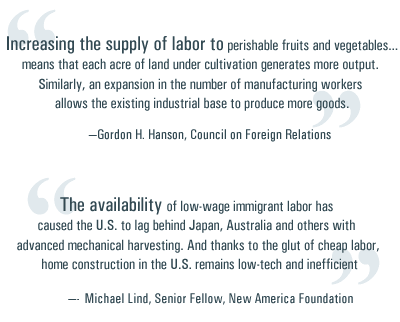Unauthorized Immigration & the U.S. Economy

(Shutterstock.com)
Read an Article about Unauthorized Immigration and the U.S. Economy
Background
In 2007, the U.S. Census Bureau reported that there were 37.5 million foreign-born people living in the United States. Approximately 12 million of them are undocumented, otherwise referred to as “illegal immigrants” or “unauthorized immigrants.” Most of these unauthorized immigrants come to the United States to work and earn more money than they could make in their own countries.
An Overview of the Controversy
Do unauthorized immigrants harm the American economy? There is widespread disagreement about how that question should be answered. Supporters of the rights of unauthorized immigrants contend that unauthorized immigration causes no economic harm. In fact, they claim, undocumented immigrants keep American industries (like agriculture) competitive, help the economy by purchasing goods and services, and pay their fair share of taxes. Opponents argue that unauthorized immigration is unfair to American workers, increases the economic burdens on public services (like public education), and results in fewer taxes collected by the government.

Controversy in Focus: What Economists Think
In April 2006, the Wall Street Journal conducted a survey of 46 economists on the subject of unauthorized immigration’s effect on the U.S. economy. The economists disagreed on whether unauthorized immigration harmed lower-income American citizens. Twenty percent said the effect was significant. Fifty-nine percent said the effect was only slight, and 22 percent said there was no effect at all. Out of the 46 surveyed, 44 believed that unauthorized immigration benefited more than harmed the U.S. economy. Opposing opinions were expressed a few months later in a September 2006 article in the Washington Times. The article cited other economists who believe that the use of cheap labor stalls the development of advanced technology in agriculture and manufacturing.


